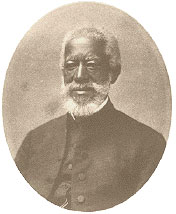Readings:
Sirach 39:6–11
Psalm 19:7-11
James 1:2-5
Mark 4:21-25Preface of a Saint (3)
[Common of a Missionary]
[Common of a Pastor]
[For the Ministry]
[For the Mission of the Church]
PRAYER (traditional language):
Almighty and everlasting God, we thank thee for thy servant Alexander Crummell, whom thou didst call to preach the Gospel to those who were far off and to those who were near: Raise up, we beseech thee, in this and every land, evangelists and heralds of thy kingdom, that thy church may proclaim the unsearchable riches of our Savior Jesus Christ; who liveth and reigneth with thee and the Holy Spirit, one God, now and for ever. Amen.
PRAYER (contemporary language):
Almighty and everlasting God, we thank
you for your servant Alexander Crummell, whom you called to preach the
gospel to those who were far off and to those who were near: Raise up, in
this and every land, evangelists and heralds of your kingdom, that your
church may proclaim the unsearchable riches of our Savior Jesus Christ;
who lives and reigns with you and the Holy Spirit, one God, now and for
ever. Amen.
Lessons revised in Lesser Feasts & Fasts 2024.
Return to Lectionary Home Page
Webmaster: Charles Wohlers
Last updated: 12 July 2025
ALEXANDER CRUMMELL
PRIEST, MISSIONARY, EDUCATOR (10 SEP 1898)
 Alexander
Crummell was born in New York City in 1819, and wished to study for the
priesthood, but received many rebuffs because he was black. He was ordained
in the Diocese of Massachusets in 1844, when he was 25 years old, but
was excluded from a meeting of priests of the diocese, and decided to
go to England. After graduating from Cambridge, he went to Liberia, an
African country founded under American auspices for the repatriation of
freed slaves. Crummell hoped to see established in Liberia a black Christian
republic, combining the best of European and African culture, and led
by a Western-educated black bishop. He visited the United States and urged
blacks to join him in Liberia and and swell the ranks of the church
there. His work in Liberia ran into opposition and indifference, and he
returned to the United States, where he undertook the founding and strengthening
of urban black congregations that would provide worship, education, and
social services for their communities. When some bishops proposed a separate
missionary district for black parishes, he organized a group, now
known as the Union of Black Episcopalians, to fight the proposal.
Alexander
Crummell was born in New York City in 1819, and wished to study for the
priesthood, but received many rebuffs because he was black. He was ordained
in the Diocese of Massachusets in 1844, when he was 25 years old, but
was excluded from a meeting of priests of the diocese, and decided to
go to England. After graduating from Cambridge, he went to Liberia, an
African country founded under American auspices for the repatriation of
freed slaves. Crummell hoped to see established in Liberia a black Christian
republic, combining the best of European and African culture, and led
by a Western-educated black bishop. He visited the United States and urged
blacks to join him in Liberia and and swell the ranks of the church
there. His work in Liberia ran into opposition and indifference, and he
returned to the United States, where he undertook the founding and strengthening
of urban black congregations that would provide worship, education, and
social services for their communities. When some bishops proposed a separate
missionary district for black parishes, he organized a group, now
known as the Union of Black Episcopalians, to fight the proposal.
by James Kiefer
[More information can be found on a site devoted to Black history; also available is a profile on him, from WEB DuBois' The Souls of Black Folk.]